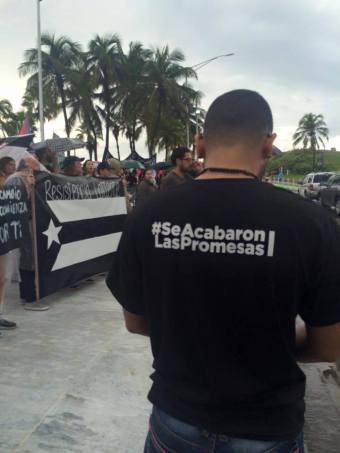
Versión en español aquí
This syllabus provides a list of resources for teaching and learning about the current economic crisis in Puerto Rico. Our goal is to contribute to the ongoing public dialogue and rising social activism regarding the debt crisis by providing historical and sociological tools with which to assess its roots and its repercussions. The materials gathered help place the current moment within the larger political, social, and economic history of this U.S. territory and illuminate how both the crisis and its proposed solutions are impacting the daily lives of millions of Puerto Ricans both within the territory and across its growing diaspora.
Each topic has a few key texts along with some primary documents and multimedia and at times suggestions for further reading. We have included texts in both English and Spanish in order to make this syllabus as accessible as possible to different audiences and are working towards a fully bilingual version. We realize that the topic of debt is intimidating for many, so we we have sought to provide a carefully curated portal with various points of entry, along with a longer extended bibliography that will continue to grow with your suggestions. We hope these materials can help make sense of a context that is still unfolding and which is yet to be fully historicized and analyzed. As events continue to unfold, we expect this syllabus to continue evolving and welcome suggestions emailed to us at PRSyllabus@gmail.com or by using the hashtag #PRSyllabus on Facebook, Twitter, and other social media sites.
This project emerges from synergies between the Unpayable Debt working group at Columbia University convened by Frances Negrón-Muntaner and Sarah Muir, and syllabus project leaders Yarimar Bonilla, Marisol Lebrón and Sarah Molinari. The goal of the working group is to raise critical questions about the role of debt in contemporary capitalism; the relationship between debt, migration, and violence; and the emergence of new political and cultural identities. #PRSyllabus is the first in a series of three syllabi on the theme of debt that Unpayable Debt will release between 2017 to 2018 in response to the crippling effect on debt on various regions of the world, including Detroit, the Caribbean, Argentina, and Greece.
This project draws inspiration from and is in dialogue with other collective projects of intellectual community building such as the #CharlestonSyllabus, #StandingRockSyllabus, #ImmigrationSyllabus, #TrumpSyllabus2.0 and #IslamophobiaIsRacismSyllabus. (Greater discussion about the concept of hashtag syllabi can be found here, here, and here.) Like those projects, we hope that this resource can serve as a springboard for discussion and analysis of how the debt crisis is affecting the lives and futures of millions of Puerto Ricans across the territory and in the diaspora. As educators committed to social justice, we hope that this syllabus project not only educates a greater public about what is occurring in Puerto Rico, but also serves as a call to action against the imposition of even greater neoliberal austerity measures, which will only increase harm and insecurity in the lives of more and more Puerto Ricans.
Goals of Syllabus
- To understand how the contemporary Puerto Rican debt crisis has its roots in the colonial and capitalist relationship between Puerto Rico and the United States
- To show how the debt crisis is affecting the lives of millions of Puerto Ricans in the territory and the diaspora.
- To provide examples of Puerto Rican groups organizing against the austerity measures being imposed upon them by Washington and Wall Street.
PROJECT LEADERS
Yarimar Bonilla is Associate Professor in the Department of Latino and Caribbean Studies and the Department of Anthropology at Rutgers University. She is the author of Non-Sovereign Futures: French Caribbean Politics in the Wake of Disenchantment (2015), and has written broadly about social movements, historical imaginaries, and questions of sovereignty in the Caribbean. Her latest book project, Puerto Rico’s American Dream, examines the emergence and rising popularity of the Puerto Rican statehood movement, with a focus on how and why annexation has come to be imagined as a form of anti-colonial politics. Follow her on Twitter @yarimarbonilla.
Marisol LeBrón is Assistant Professor in the Department of American Studies at Dickinson College. An interdisciplinary scholar, her research and teaching focus on social inequality, policing, violence, and protest. She is currently at work on her first book, Policing Life and Death: Race, Violence, and Resistance in Puerto Rico, which examines the growth of punitive governance in contemporary Puerto Rico. Follow her on Twitter @marisollebron.
Sarah Molinari is a PhD student in Cultural Anthropology at The Graduate Center, CUNY. She has research experience in Vieques, Cabo Rojo, and San Juan, Puerto Rico and is currently developing her dissertation project on debt resistance and intergenerational indebtedness in Puerto Rico. Follow her on Twitter @sarahmolinari.
Isabel Guzzardo Tamargo is a PhD student in the graduate program of Literatures in English at Rutgers University. Her interests include Caribbean literature, decolonial theory, and issues of sexual citizenship.
Shakti Castro is a public historian working in the field of harm reduction. Her research focuses on the history of Puerto Ricans and Latinxs in harm reduction and drug policy reform in New York City. She holds an MA in History from the University of Massachusetts Amherst. Follow her on Twitter @medeaculpa.
The contributors would like to thank Ed Morales, Patricia Silver, Vladimir Pérez, and Amanda Haziz-Ginsberg for their feedback and suggestions. We are also grateful to Xiomara Caro and Mario Ruben Carrion for sharing their photographs with us.
Traducción al español: Javier Arbona-Homar, Universidad de California – Davis. Follow him on Twitter: @AlJavieera